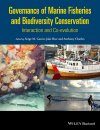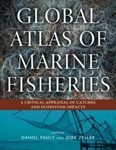About this book
Governance of Marine Fisheries and Biodiversity Conservation arose from IUCN-CEM-FEG workshop and deals with ocean fisheries management and related marine ecosystems, biodiversity and conservation, focusing on their interaction and any synergies. To the extent that this will help to improve understanding and perspective, broader considerations, e.g. touching on inland fisheries or conservation in terrestrial systems, or on the co-evolution of other uses and conservation policies (e.g. in forestry or wildlife management) are included. Governance of Marine Fisheries and Biodiversity Conservation illustrates concepts and principles using actual case studies. Highlighting areas of convergence and divergence, the book offers perspectives on the co-evolution of marine responsible fishery management and conservation.
Contents
Notes on contributors viii
Foreword by Bonnie J. McCay xvi
Foreword by Árni M. Mathiesen xviii
Foreword by Braulio Ferreira de Souza Dias xx
Preface xxii
Acknowledgements xxv
List of selected acronyms xxvi
Glossary xxx
PART I: GOVERNANCE TRENDS AND CHALLENGES 1
1 Governance of marine fisheries and biodiversity conservation: A history 3
S.M. Garcia, J. Rice and A. Charles
2 Governance of marine fisheries and biodiversity conservation: Convergence or coevolution? 18
S.M. Garcia, J. Rice and A. Charles
3 Governance of marine fisheries and biodiversity conservation: the integration challenge 37
S.M. Garcia, J. Rice and A. Charles
PART II: GOVERNANCE DIMENSIONS 53
4 Bio-ecological dimensions of fisheries management, biodiversity and governance 55
J. Rice and P. Mace
5 The economic dimension: addressing behaviour, incentives and context for effective governance 68
S. Hanna
6 The social dimension: the challenge of dealing with equity 82
B. Hersoug
7 The global legal dimension: navigating the legal currents of rights and responsibilities 96
A.H. Hoel and D. VanderZwaag
8 Spatial dimensions of fisheries and biodiversity governance 110
R. Kenchington, O. Vestergaard and S.M. Garcia
9 Scientific foundation: towards integration 124
J. Rice, S. Jennings and A. Charles
PART III: GLOBAL GOVERNANCE 137
10 Global level institutions and processes: frameworks for understanding critical roles and foundations of cooperation and integration 139
L. Ridgeway
11 Global level institutions and processes: assessment of critical roles, foundations of cooperation and integration and their contribution to integrated marine governance 148
L. Ridgeway
12 Integrative policy and legal instruments, approaches and tools: fisheries and biodiversity conservation 166
B. Kuemlangan, J. Sanders, P. Deupmann and C. De Young
13 Conservation and risk of extinction of marine species 181
P. Mace, C. O’Criodain, J. Rice and G. Sant
14 Parallel initiatives: CBD’s Ecologically or Biologically Significant Areas (EBSAs) and FAO’s Vulnerable Marine Ecosystems (VMEs) criteria and processes 195
J. Rice, J. Lee and M. Tandstad
PART IV: REGIONAL GOVERNANCE 209
15 Regional governance for fisheries and biodiversity 211
R. Warner, K.M. Gjerde and D. Freestone
16 Regional governance: the case of NEAFC and OSPAR 225
K. Hoydal, D. Johnson and A.H. Hoel
17 Regional governance: the Mediterranean cradle 239
F. Simard, M. Camilleri and L. Sbai
18 CCAMLR and Antarctic conservation: the leader to follow? 253
D. Miller and N.M. Slicer
19 Implementation of the Ecosystem Approach to Fisheries in the Benguela Current LME area 271
J. Augustyn, S. Petersen, L. Shannon and H. Hamukuaya
20 Governance of marine fisheries and conservation in the context of the European Union 285
S. Beslier and B. Drobenko
PART V: NATIONAL GOVERNANCE 299
21 The use of national frameworks for sustainable development of marine fisheries and conservation, ecosystem-based management and integrated ocean management 301
K. Sainsbury, P. Gullestad and J. Rice
22 Small-scale fisheries: importance, vulnerability and deficient knowledge 317
J. Kolding, C. Béné and M. Bavinck
23 Stewardship in tropical small-scale fisheries: community and national perspectives 332
P. Christie, L.M. Campbell and N. Armada
24 Making space for small-scale fishing communities: use and misuse of spatial management instruments 346
M.R. Sowman, R. Rajagopalan, C. Sharma and J. Sunde
25 ENGOs and SIDS: environmental interventions in small island developing states 360
P. McConney, R. Pomeroy and Z. Khan
26 The role of capacity building for improving governance of fisheries and conservation of marine ecosystems 374
J.C. Seijo and S. Salas
27 Fishers’ organizations: their role in decision-making for fisheries and conservation 385
M. Makino, A.S. Cabanban and S. Jentoft
28 The role of courts in fisheries management and marine biodiversity protection: US and EU systems 398
P. Shelley and T. van Rijn
PART VI: CONCLUSION 411
29 A tale of two streams: synthesizing governance of marine fisheries and biodiversity conservation 413
A. Charles, S.M. Garcia and J. Rice
ANNEXES
Annex 1: History of fisheries and biodiversity conservation: A timeline of key events (1850–2012) 429
Annex 2: Key global institutions, bodies and processes: Roles, participation and main focus 461
Index 497
Customer Reviews
Biography
Serge M. Garcia is the former Research Director of the French Institute of Research for Development (IRD) and former Director of the FAO Fisheries Management Division. Now retired, he chairs the Fisheries Expert Group of the IUCN Commission on Ecosystem Management (IUCN-CEM-FEG) established under the coordination of the European Bureau of Conservation and Development (EBCD).
Jake Rice is Chief Scientist, Department of Fisheries and Oceans, Government of Canada (DFO) and senior Canadian science advisor on international marine conservation and sustainable use policy. He has over 250 scientific and technical publications, in 32 years in the Science sector of DFO. He has been active as a scientific expert and in delegations to CBD, FAO, IPCC and various UN working groups. He is the vice chair of IUCN-CEM-FEG.
Anthony Charles is Director of the School of the Environment and Professor in the School of Business at Saint Mary's University (Halifax, Canada). He is a Pew Fellow in Marine Conservation, and leads the international Community Conservation Research Network. His work focuses on marine resource management, economics and policy, coastal communities and small-scale fisheries. He is an active member of the IUCN-CEM-FEG.
















![Les îles Saint-Paul et Amsterdam (Océan Indien Sud): Environnement Marin et Pêcheries [Saint-Paul and Amsterdam Islands (South Indian Ocean): Marine Environment and Fisheries]](http://mediacdn.nhbs.com/jackets/jackets_resizer_medium/26/260268.jpg?height=150&width=107)


















